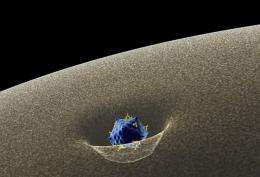Scientists redefine how our immune system responds to viruses

(PhysOrg.com) -- Landmark research from the Medical Research Council (MRC) has discovered that antibodies can fight viruses from within infected cells. This finding transforms the previous scientific understanding of our immunity to viral diseases like the common cold, 'winter vomiting' and gastroenteritis. It also gives scientists a different set of rules that pave the way to the next generation of antiviral drugs.
Viruses are mankind's biggest killer, responsible for twice as many deaths each year as cancer, yet they are among the hardest of all diseases to treat. Previously scientists believed that antibodies could only reduce infection by attacking viruses outside cells and also by blocking their entry into cells.
Scientists at the MRC Laboratory of Molecular Biology in Cambridge have now shown that antibodies remain attached when viruses enter healthy cells. Once inside, the antibodies trigger a response, led by a protein called TRIM21, which pulls the virus into a disposal system used by the cell to get rid of unwanted material. This process happens quickly, usually before most viruses have chance to harm the cell. The MRC scientists have further shown that increasing the amount of TRIM21 protein in cells makes this process even more effective, suggesting new ways of making better antiviral drugs.
Dr Leo James from the MRC Laboratory of Molecular Biology (LMB) and lead author of the study, said: “Doctors have plenty of antibiotics to fight bacterial infections but few antiviral drugs. Although these are early days, and we don’t yet know whether all viruses are cleared by this mechanism, we are excited that our discoveries may open multiple avenues for developing new antiviral drugs.”
“Antibodies are formidable molecular war machines; it now appears that they can continue to attack viruses within cells. This research is not only a leap in our understanding of how and where antibodies work, but more generally in our understanding of immunity and infection,” says Sir Greg Winter, deputy director of the MRC Laboratory of Molecular Biology.
Dr James' team is working with MRC Technology to bring this exciting finding from laboratory bench to doctor's cabinet as quickly as possible. This is basic research in cells. The next stage is to progress this finding through to clinical trials.
The paper: Antibodies mediate intracellular immunity through tripartite motif-containing 21 (TRIM21), is published online by Proceedings of the National Academy of Sciences today.
More information: Leo C. James et al., Antibodies Q:1 mediate intracellular ; 2 immunity through tripartite motif-containing 21 (TRIM21), PNAS www.pnas.org/cgi/doi/10.1073/pnas.1014074107


















